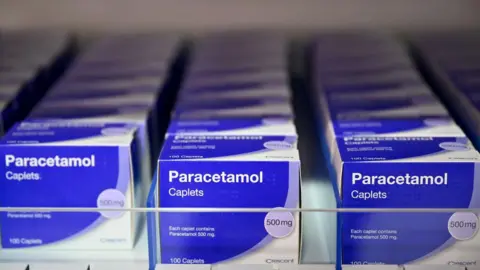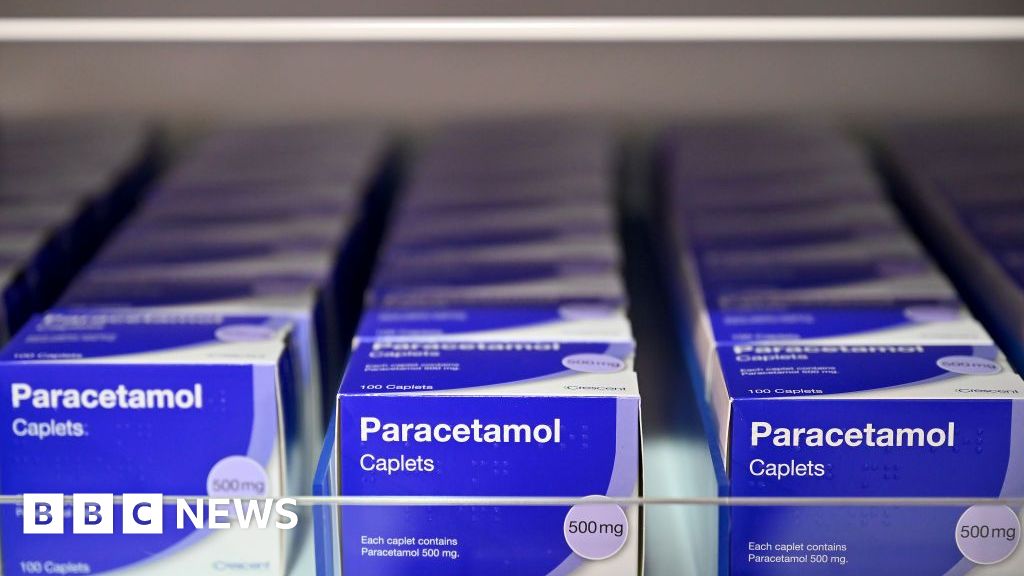 PA Media
PA MediaPregnant women should ignore Donald Trump’s claims that taking paracetamol could lead to their child having autism, the UK’s health secretary has said.
“I trust doctors over President Trump,” Wes Streeting told ITV’s Lorraine programme, adding that expectant mothers should not pay “any attention whatsoever” to the US president’s unfounded claims.
It comes after Trump said that the pain reliever Tylenol, known as paracetamol in the UK, “is no good” for pregnant women to use, citing a disputed link between the drug and autism.
Medical experts have strongly pushed back, and health officials in the UK have stressed that paracetamol remains the safest painkiller available to pregnant women.
On its website, the NHS says it is “the first choice of painkiller if you’re pregnant. It’s commonly taken during pregnancy and does not harm your baby.”
Aspirin and ibuprofen are not normally recommended because these drugs can affect the baby’s circulation. Untreated fever in pregnancy can also be potentially harmful in pregnancy.
On Monday, Trump announced that doctors in the US would be advised not to prescribe Tylenol to pregnant women, who, he said, should “fight like hell not to take it”.
However, on Tuesday morning, Streeting said: “I’ve just got to be really clear about this: there is no evidence to link the use of paracetamol by pregnant women to autism in their children. None.”
He cited a major Swedish study last year involving 2.4 million children, which found no link between the drug and autism.
“Don’t pay any attention whatsoever to what Donald Trump says about medicine,” Streeting said, urging people to instead listen to British doctors, scientists and the NHS.
Health authorities were quick to denounce Trump’s claims.
The UK’s National Autistic Society, which represents autistic people and their families, criticised him for spreading misinformation and “fearmongering”.
“This is dangerous, it’s anti-science and it’s irresponsible,” said the organisation’s Mel Merritt in a strongly worded statement.
The Trump administration is “peddling the worst myths” and “undermining decades of research by respected experts in the field”, she added.
 Getty Images
Getty ImagesTrump’s announcement follows a review of research in August, led by the dean of Harvard University’s Chan School of Public Health, which found a potential association, meaning that children may be more likely to develop autism and other neurodevelopmental disorders when exposed to Tylenol during pregnancy. But there may be other explanations for that link.
The team analysed 46 older studies, of which 27 reported a link between the use of acetaminophen, the active ingredient in the painkiller, and an increased risk of neurodevelopmental disorders including autism and ADHD. But others they looked at showed no significant link.
The authors said that more research was needed to confirm the findings, but recommended cautious time limited use of the drug. They also recognised that it was still important for treating maternal fever and pain.
Another study conducted in Japan earlier this year found a small increased risk of autism linked to acetaminophen. But it said “misclassification and other biases may partially explain these associations”.
But the Swedish study last year found no evidence to support a casual link between autism and acetaminophen.
The widely held view of researchers is that there is no single cause of autism, which is thought to be the result of a complex mix of genetic and environmental factors.
In a statement to the BBC, Tylenol maker Kenvue said the science clearly shows that taking acetaminophen does not cause autism.
“We strongly disagree with any suggestion otherwise and are deeply concerned with the health risk this poses for expecting mothers.”
Monique Botha, a professor in social and developmental psychology at Durham University, said the “fearmongering” could stop women from seeking appropriate care during their pregnancy.
“There is no robust evidence or convincing studies to suggest there is any causal relationship,” the professor said, adding that paracetamol is a “a much safer pain relief option during pregnancy than basically any other alternative”.
Echoing this, Professor Claire Anderson, president of the Royal Pharmaceutical Society, said that the drug has been “used safely by millions of people for decades, including during pregnancy”.
In the US, the president of the American College of Obstetricians and Gynecologists disputed the link made by Trump, and said there is “no clear evidence that proves a direct relationship” between the use of acetaminophen and foetal developmental issues.
Dr Steven Fleischman said the claim “dangerously simplifies the many and complex causes of neurologic challenges in children”.
In a notice to doctors, the US Food and Drug Administration (FDA) said professionals should consider limiting the use of Tylenol, while also taking into account that it is the safest over-the-counter option to treat fever and pain in pregnant women, which can also harm maternal and foetal health.
“To be clear, while an association between acetaminophen and autism has been described in many studies, a causal relationship has not been established and there are contrary studies in the scientific literature,” the FDA wrote.
Speaking alongside Trump, US Health Secretary Robert F Kennedy Jr said the FDA would also begin the process of initiating a safety label change on the medication and launch a public health campaign to spread awareness.
In the past, Kennedy has offered debunked theories about the rising rates of autism, blaming vaccines despite a lack of evidence.
Trump has also promoted unsubstantiated medical claims, including during the Covid-19 pandemic.


